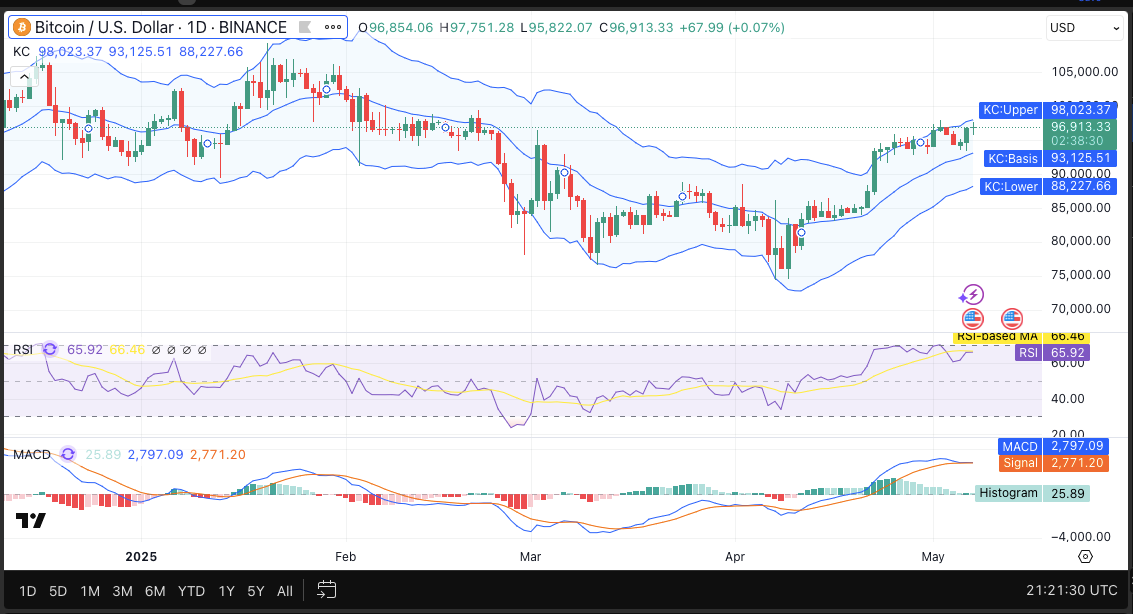Key Insights:
- Bitcoin has reached a new high against the S&P 500, showing strong performance compared to traditional equity benchmarks.
- Mike McGlone from Bloomberg Intelligence warned about a declining Bitcoin-to-gold ratio, which could indicate long-term weakness.
- The BTC-to-gold ratio has dropped significantly from its 2021 peak, suggesting Bitcoin is underperforming against gold.
Bitcoin (BTC) has reached new highs against the S&P 500, but a potential warning sign may surface. While market momentum remains strong, Bloomberg’s Mike McGlone highlights a weakening Bitcoin-to-gold ratio.
This divergence could suggest structural cracks in Bitcoin’s performance compared to traditional safe-haven assets.
McGlone Warns of Bitcoin Gold Shift
Bitcoin has recently surged to historic levels against the S&P 500, showing stronger performance than major traditional equity benchmarks.
As of May 8, 2025, Bitcoin was trading at around $99,579.28, after bouncing from an intraday low of $95,822. However, despite outperforming stocks, it has been losing ground to gold in relative valuation.
Mike McGlone, senior commodity strategist at Bloomberg Intelligence, issued a warning based on the falling BTC-to-gold ratio.
According to him, this ratio has significantly declined from its 2021 peak, weakening Bitcoin’s relative strength against gold. He believes the decreasing value of Bitcoin measured in gold ounces signals a bearish divergence.
While Bitcoin edges near the $100,000 mark, purchasing a single Bitcoin now takes fewer ounces of gold. This shift could reflect a loss of Bitcoin’s safe-haven status compared to gold.
McGlone has previously stated that Bitcoin could drop significantly and “lose a zero,” implying a major correction.
Bitcoin Price Eyes $100K Amid Bullish Signals
Despite McGlone’s alert, current technical indicators suggest continued strength in Bitcoin’s short-term trend.
The Relative Strength Index (RSI) stands at 65.92, indicating moderate momentum that is not yet overextended. RSI’s moving average at 66.46 supports this upward pressure and hints at more room for price increases.
The Moving Average Convergence Divergence (MACD) reinforces this sentiment with a bullish crossover above the signal line.
The MACD line at 2,797.09 remains higher than the signal line at 2,771.20, sustaining a positive market tone. Meanwhile, the MACD histogram prints a bullish value of 25.89, confirming trend continuation.

Additionally, Bitcoin is above the Keltner Channel basis of $93,125, indicating strong price momentum and limited downside risk.
The $98,023 mark was expected to present short-term resistance. Now that this level is broken, a psychological test of the $100,000 barrier is imminent.
Robert Kiyosaki Highlights Bitcoin’s Scarcity Advantage
Amid discussions surrounding Bitcoin’s value, financial author Robert Kiyosaki reaffirmed his preference for Bitcoin compared to gold and silver.
He pointed out that Bitcoin’s fixed cap of 21 million coins ensures a limited and unchangeable supply. This characteristic, he claims, adds unique value that physical assets cannot replicate.
Kiyosaki also noted that while he owns physical gold, silver, and resource-based assets, their supply can always increase with demand.
In contrast, Bitcoin’s coded limit prevents any circulation expansion, enhancing its long-term appeal. He continues to allocate capital into Bitcoin due to its deflationary nature and scarcity.
This perspective supports Bitcoin’s narrative as a digital store of value, especially in increasing liquidity and currency debasement environments.
However, even Kiyosaki’s stance doesn’t dismiss the possibility of short-term volatility or temporary corrections. Bitcoin’s limited supply does not eliminate market speculation or macroeconomic influence.
While Bitcoin’s chart signals strength, the broader picture reveals contrasting signals that merit attention.
McGlone’s warning highlights a notable BTC/gold ratio breakdown, which hasn’t mirrored Bitcoin’s equity market strength. This indicates Bitcoin may be diverging from the characteristics that once defined it as a hedge.
